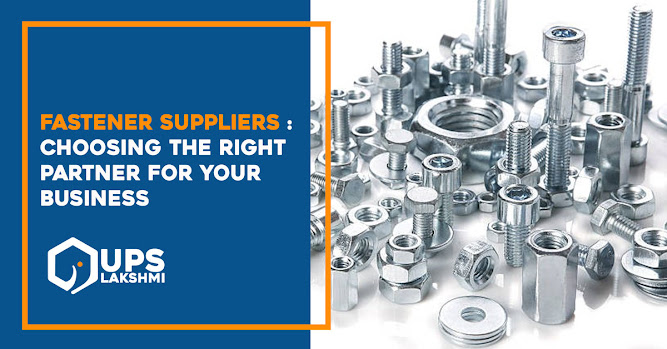Role of Fasteners in Industrial Maintenance and Repair
Fasteners play a crucial role in industrial maintenance and repair, ensuring the stability, safety, and longevity of various structures and equipment. Whether it's a manufacturing facility, a construction site, or machinery maintenance, fasteners are essential components that hold everything together.
Here are the key points highlighting the significance of fasteners in industrial maintenance and repair:
- Structural Integrity:
Fasteners, such as bolts and screws, are responsible for holding
structural elements together. They provide the necessary strength and
stability to withstand external forces, vibrations, and other stresses. In
industrial settings, where heavy machinery, equipment, and infrastructure
are involved, reliable fasteners are critical to maintaining the
structural integrity and preventing failures or accidents.
- Equipment Assembly: During
the assembly of industrial equipment, fasteners are used to secure
different components together. From securing electrical panels and control
cabinets to attaching motors and conveyor systems, fasteners ensure that
the equipment is properly assembled and functions efficiently. They enable
quick and precise installation, reducing downtime and ensuring the smooth
operation of machinery.
- Maintenance and Repairs:
Fasteners are frequently used in maintenance and repair tasks to replace
worn-out or damaged components. Whether it's replacing a broken bolt on a
conveyor system or fixing a loose panel on a production line, fasteners
allow for efficient and effective repairs. They help in restoring
equipment to its optimal condition, reducing downtime and improving
productivity.
- Versatility: Fasteners come
in various types, sizes, and materials, making them adaptable to different
industrial applications. From stainless steel bolts in corrosive
environments to high-strength fasteners in heavy-duty machinery, the
versatility of fasteners allows them to be used in a wide range of maintenance
and repair tasks. This versatility ensures that the right fastener can be
selected for each specific application, ensuring optimal performance and
longevity.
- Safety: Fasteners
contribute to the overall safety of industrial facilities and equipment. Properly
tightened and secure fasteners prevent components from loosening or
falling apart, minimizing the risk of accidents or injuries. In industries
where worker safety is paramount, such as manufacturing and construction,
reliable fasteners are essential for ensuring a safe working environment.
- Quick and Efficient Fixes: Fasteners
offer the advantage of quick and efficient repairs. In industrial
settings, time is often of the essence, and fasteners enable maintenance
teams to swiftly address issues and get equipment back up and running. The
ease of replacing fasteners simplifies the repair process, allowing for
efficient fixes without the need for complex or time-consuming procedures.
- Longevity and Reliability: Quality fasteners, such as those manufactured by Universal Precision Screws (UPS), are designed to withstand harsh conditions and heavy usage. They are engineered to provide durability and longevity, ensuring that industrial structures and equipment remain secure and operational for extended periods. Reliable fasteners minimize the need for frequent replacements or repairs, reducing maintenance costs and downtime.
Fasteners play a crucial role in industrial maintenance and repair. From ensuring structural integrity and equipment assembly to facilitating quick and efficient fixes, reliable fasteners are vital components in various industrial applications.
Universal Precision Screws (UPS), as a leading fastener manufacturer in India, understands the importance of quality and reliability in industrial maintenance. With their range of top-quality fasteners, UPS Lakshmi contributes to the safe and efficient operation of industrial facilities, supporting maintenance and repair tasks across diverse sectors. To know more visit- https://www.upsind.com/




Comments
Post a Comment